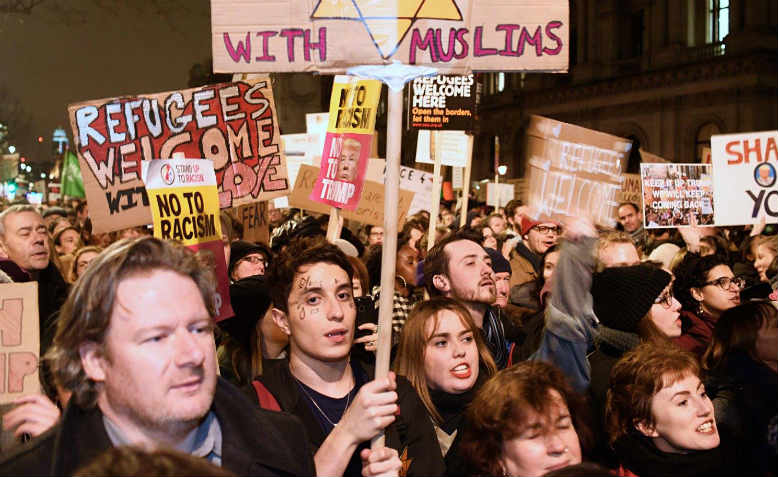 Emergency anti-Trump protest, Westminster, 30 January 2017. Photo: Jim Aindow
Emergency anti-Trump protest, Westminster, 30 January 2017. Photo: Jim Aindow
Recent protests contain the seeds of future victories but nothing is automatic, notes Lindsey German
It’s quite something for Donald Trump to have become so unpopular so quickly that he is generating demonstrations against his policies on a daily basis. The ban on Muslims from seven countries, including a number that the U.S. has invaded, has created outrage even greater than that felt previously.
The demonstrations at US airports have been a massive show of solidarity with those trapped in limbo, refused entry into a country which has implemented some of the most racist policies seen in generations.
Despicable
Monday’s demonstrations in Britain were another great act of solidarity with Muslims and in opposition to Trump. But they have also very clearly and vociferously been directed against the British government and the role of Theresa May, which has been nothing short of despicable.
May’s haste to rush to meet Trump was nauseating, her hand-holding revolting. But her refusal to condemn the ban when questioned about it three times on Saturday was a calculated and unprincipled strategy to keep Trump happy. Her climbdown has been slow and pathetic.
Every day her unpopularity will grow because she is now associated with Trump. Today we found out that she was informed about the ban on her visit. So her refusal to condemn Trump was because she agreed with him.
Petition
Despite huge protests and over 1.5 million signatures on a petition to cancel Trump’s state visit until the ban is lifted, the government says the visit will go ahead. There is still much to do to stop it.
There will be more protests including the one on Saturday. There has to be a mass movement to stop Trump, and if he comes here then the biggest possible protests in this country.
This also opens up, both here and in the US, the possibility of much wider change.

